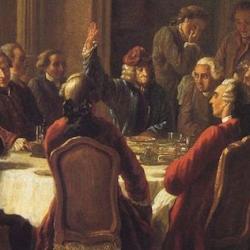“Originally and properly,” writes John McManners (Death and the Enlightenment), the term “dechristianization” refers “to the anti-religious manifestations of the French Revolution,” which were “neither homogenous in character nor unambiguous in meaning.” Dechristianization refers in part to administrative, institutional changes: “The transfer to the secular authorities of the registration of births, marriages, and deaths, and the institution of divorce marked an overthrow of the concept of a ‘Christian civilization,’ of the hope that the Republic would be as ‘Christian’ as the Monarchy had been” (440–1).
More aggressively, revolutionaries engaged in “profanation of churches and tombs, the changing of religious personal names and place-names, the anticlerical masquerades, the forced abdication of priests, the celebration of festivals of Reason and of the Etre Supreme” (441).
Prior to 1789, the French church was undergoing a reform movement and French civilization was trending toward “deism, scepticism, irreligion and anticlericalism.” Dechristianization was a “sudden intensification and focusing” of these trends, so much that “there is a radical discontinuity between manifestations of opposition to Catholicism under the ancien regime and in the febrile days of the high Revolution” (442). McManners prefers to call the pre-Revolution trends a process of “laicization,” which suggests “the erosion of the Church’s alliance with power rather than a threat to the essence of revealed religion” (442).
Indeed, dechristianization trades on the questionable assumption that pre-Revolutionary France was deeply Christianized in the first place. McManners summarizes Jean Delumeau’s skeptical question: “what would be left of eighteenth-century Catholicism if we took away routine conformity, official observances, the unhealthy religiosity which turns its back on the problems of society, the magical and superstitious undertones, Manicheism, and fear?” (442).
Point taken, yet an officially Christian public order is not nothing. It expresses some, albeit very thin, response to the biblical demand to “kiss the Son.”









